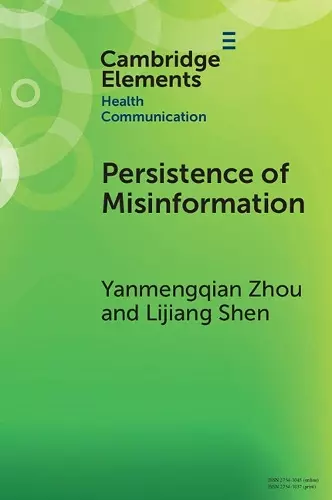Persistence of Misinformation
Biased Cognitive Processing and Polarization
Lijiang Shen author Yanmengqian Zhou author
Format:Paperback
Publisher:Cambridge University Press
Published:6th Feb '25
Currently unavailable, and unfortunately no date known when it will be back
This paperback is available in another edition too:
- Hardback£49.99(9781009565349)

Reviews and analyses the underlying mechanisms why health-related misinformation persists despite fact-checking efforts.
Misinformation can be defined as information that is inaccurate or false according to the best available evidence, or information whose validity cannot be verified. It is created and spread with or without clear intent to cause harm. There is evidence that misinformation persists despite fact-checking and the presentation of corrective information.Misinformation can be broadly defined as information that is inaccurate or false according to the best available evidence, or information whose validity cannot be verified. It is created and spread with or without clear intent to cause harm. There is well-documented evidence that misinformation persists despite fact-checking and the presentation of corrective information, often traveling faster and deeper than facts in the online environment. Drawing on the frameworks of social judgment theory, cognitive dissonance theory, and motivated information processing, the authors conceptualize corrective information as a generic type of counter-attitudinal message and misinformation as attitude-congruent messages. They then examine the persistence of misinformation through the lens of biased responses to attitude-inconsistent versus -consistent information. Psychological inoculation is proposed as a strategy to mitigate misinformation.
ISBN: 9781009397377
Dimensions: unknown
Weight: unknown
66 pages